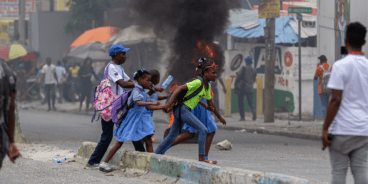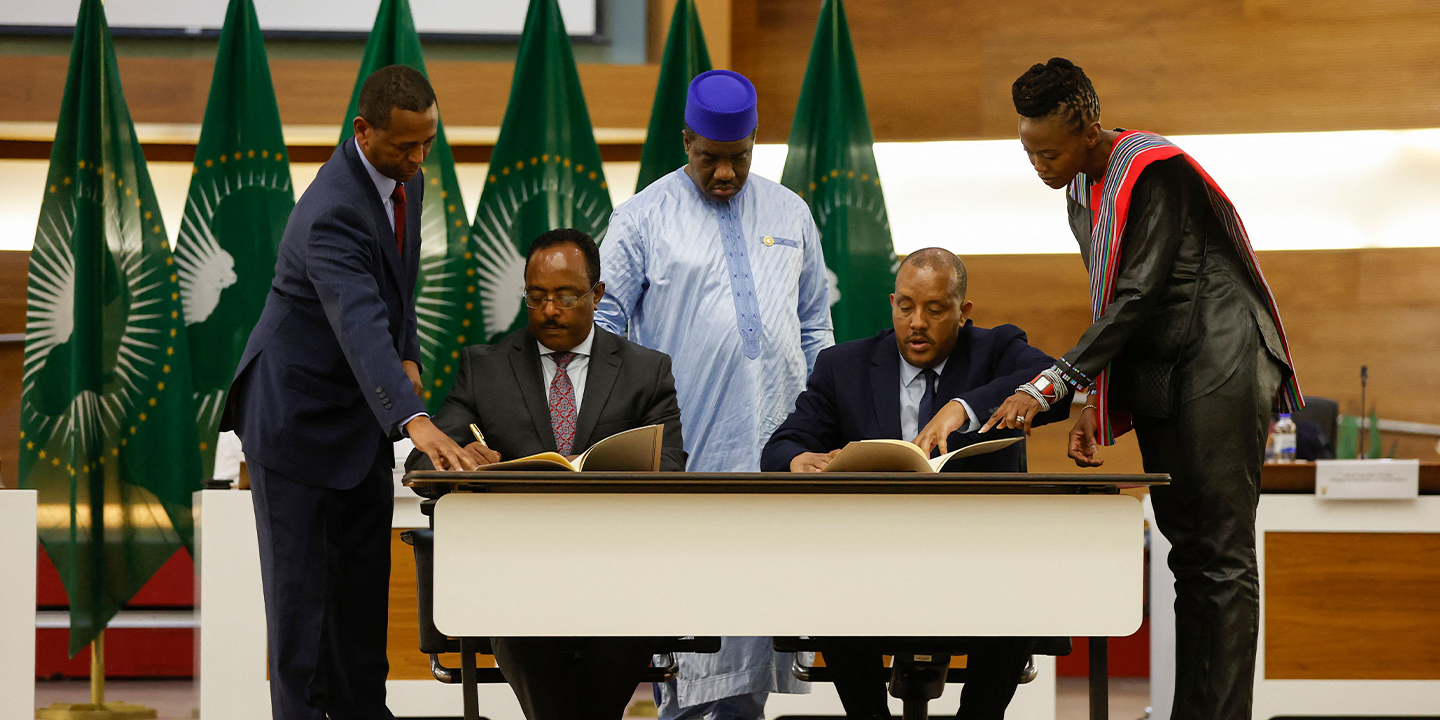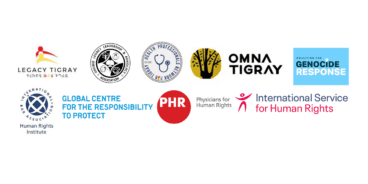

Atrocity Alert No. 325: Ethiopia, Myanmar (Burma) and Yemen
Atrocity Alert is a weekly publication by the Global Centre for the Responsibility to Protect highlighting situations where populations are at risk of, or are enduring, mass atrocity crimes.
AS WARRING PARTIES IN ETHIOPIA AGREE TO A TRUCE, ATROCITY RISKS PERSIST
On 2 November representatives of the Ethiopian federal government and the Tigrayan People’s Liberation Front agreed to the first formal cessation of hostilities in Tigray. The agreement was reached after ten days of negotiations brokered by the African Union (AU) in South Africa. For the past ten weeks populations have endured intensified fighting, attacks and mass displacement after a five-month humanitarian truce broke down on 24 August. During that time, federal forces and their Eritrean allies launched air and drone strikes on Tigrayan towns and cities, killing scores of civilians. Hours before the cessation of hostilities came into effect on 3 November, an airstrike reportedly killed 40 people in the southern Tigrayan town of Maychew.
The agreement went into effect on the same day as the second anniversary of the conflict, which has been characterized by the commission of war crimes and crimes against humanity, including the use of sexual and gender-based violence as a weapon of war and the blockade of humanitarian aid. During the conflict, reports also emerged of alleged ethnic cleansing of Tigrayans in Western Tigray.
While the agreement has been hailed as an opportunity to end the conflict in Tigray, key challenges remain, notably the complete withdrawal of Eritrean troops from Ethiopia. Despite playing a major part in the commission of atrocities throughout the conflict, Eritrean officials were not present at the negotiations. Although the agreement lays out intentions to hold perpetrators accountable for violations of international law under Ethiopian law and the AU’s Transitional Justice Policy Framework, it remains to be seen how this applies to the numerous accusations against Eritrean forces.
Savita Pawnday, Executive Director of the Global Centre for the Responsibility to Protect, said, “We welcome the cessation of hostilities in Tigray and hope it provides the desperately needed reprieve for populations. The ceasefire alone will not alleviate the risks facing populations across Ethiopia, and human rights monitoring and reporting, as well as accountability must be paramount as the agreement moves forward. Victims and survivors deserve justice for the countless atrocities perpetrated against them during the two-year war.”
AVIATION FUEL PROVIDERS FACILITATE ATROCITIES IN MYANMAR
The provision of aviation fuel by foreign companies to the military in Myanmar (Burma) is facilitating the commission of war crimes, according to a new report by Amnesty International and Justice for Myanmar. The report found that fuel shipments intended for civilian aircraft usage have been diverted to the military, whose air force has been implicated in war crimes. In recent months, Myanmar’s military, known as the Tatmadaw, has increasingly perpetrated unlawful airstrikes around the country, resulting in the death and injury of scores of civilians, as well as the displacement of thousands. In one recent example, the Tatmadaw bombed a concert in Hpakant Township, Kachin State on 23 October, killing at least 80 people and injuring over 100 in what appeared to be the single-worst air attack since the February 2021 coup. Indiscriminate airstrikes have also destroyed civilian infrastructure around the country, including homes, religious buildings, schools and medical facilities.
According to Amnesty International, in a new “concerning” development, evidence from two strikes in Mindat Township during July indicates that fighter jets have dropped illegal cluster munitions. These weapons are banned internationally as they are indiscriminate in nature. Amidst the airstrikes, the military also continues to shell villages with artillery and mortars – on occasion deliberately and indiscriminately – use internationally banned anti-personnel landmines, burn and pillage villages and extrajudicially execute, torture and arbitrarily detain civilians, among other likely atrocities.
Since 2015 the main foreign business involved in the handling, storage and distribution of aviation fuel in Myanmar has been Singapore-based Puma Energy Co., which announced in October that it would be exiting the country at an unspecified date. Oil and gas companies, including ExxonMobil, Thai Oil, PetroChina and Rosneft, have also played significant roles in the supply chain of aviation fuel in Myanmar. The Secretary General of Amnesty International, Agnès Callamard, said, “air strikes have devastated families, terrorized civilians, killed and maimed victims. But if the planes can’t fuel up, they can’t fly out and wreak havoc… We are calling on suppliers, shipping agents, vessel owners and maritime insurers to withdraw from a supply chain that is benefiting the Myanmar Air Force.”
All companies that are directly or indirectly involved in the provision of aviation fuel to Myanmar’s military should immediately halt those operations. The UN Security Council, as well as member states, should suspend the supply of aviation fuel to Myanmar until mechanisms are established to ensure that the fuel will not be used to commit human rights abuses.
CIVILIANS IN YEMEN AT GRAVE RISK WITHOUT TRUCE EXTENSION
Last month, on 2 October, parties to the conflict in Yemen failed to renew a UN-brokered truce, leaving civilians at imminent risk of mass atrocity crimes. The truce – mediated by the UN Special Envoy for Yemen – had entered into effect on 2 April and included a cessation of all attacks, the entry of fuel ships in Hodeidah ports and the operation of commercial flights in and out of Sana’a airport. This was the first negotiated country-wide ceasefire since 2016.
During the truce, civilian casualties and armed hostilities did not completely halt, but were significantly decreased. Between April and October there were no recorded airstrikes by the Saudi Arabia and United Arab Emirates-led international coalition, but some attacks on civilians and civilian objects, including ground shelling, drone attacks and the use of landmines, continued. Mwatana for Human Rights documented 14 indiscriminate ground attacks, eight attacks on medical facilities and 21 attacks that targeted or affected schools. Other human rights violations and abuses also continued during the truce, including child recruitment, arbitrary detentions, enforced disappearances and torture.
The more than seven-year conflict in Yemen has been characterized by pervasive impunity for rampant violations and abuses of international law. Impunity was further entrenched in October 2021 when the UN Human Rights Council failed to renew the mandate of the Group of Eminent Experts (GEE) on Yemen – the sole international independent mechanism dedicated to monitoring international law violations. The termination of the GEE was followed by an alarming surge in civilian harm and indiscriminate hostilities that continued until the 2 April truce. In the absence of a renewed ceasefire, there is an elevated risk of recurrence of a similar surge in abuses.
In the five weeks since the truce expired, the Office of the UN High Commissioner for Human Rights (OHCHR) has already received reports of civilians being in “grave danger,” as human rights violations and abuses, as well as attacks, have increased in frequency. During October OHCHR verified civilian casualties resulting from sniper attacks and shelling, as well as a drone attack on a port facility that “exposed civilians to unwarranted, serious risk.” Spokesperson for the UN High Commissioner for Human Rights, Jeremy Laurence, stressed, “It is clearly evident that the suffering of the Yemeni people will continue until this conflict is brought to an end.”
Any attacks that deliberately target civilians and civilian objects must immediately cease. Parties to the conflict should extend the truce and work toward a negotiated settlement to the conflict. A sustainable end to the conflict in Yemen will only be reached if peace is pursued alongside justice efforts, and the international community should take steps to establish a new mechanism to advance accountability and reparations for perpetrators of war crimes and crimes against humanity in Yemen.
Related Content


